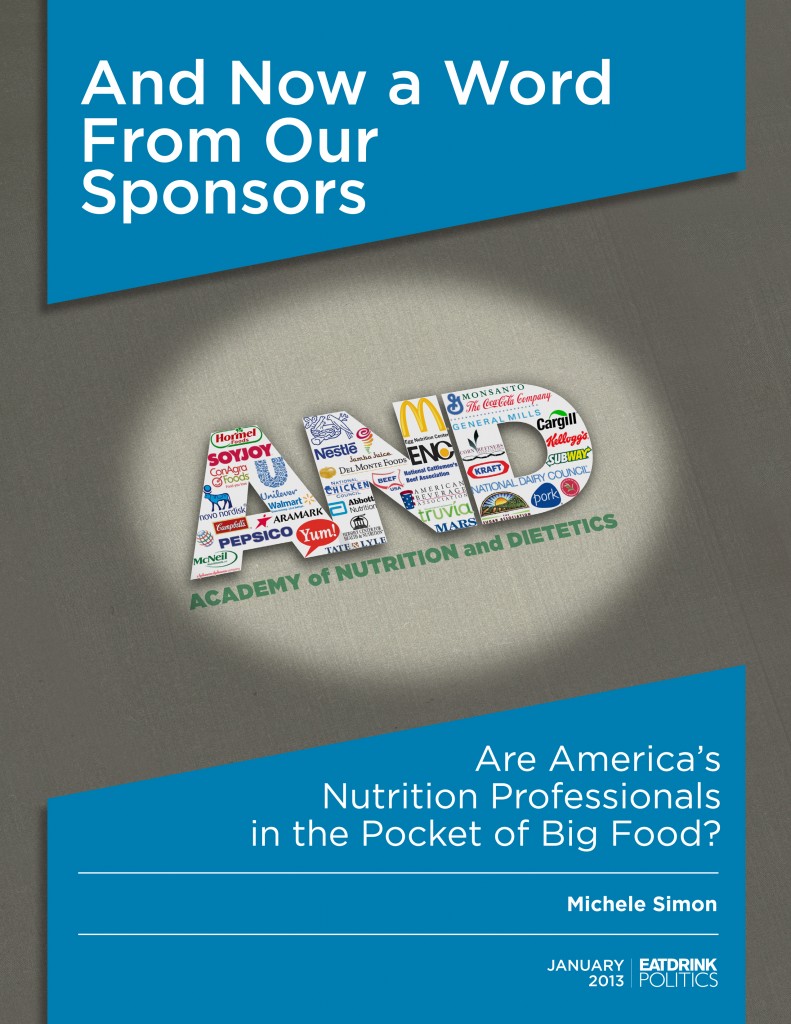In January, I released a report called, And Now a Word from Our Sponsors: Are America’s Nutrition Professionals in the Pocket of Big Food? The report continues to receive media attention, in part due to a Change.org petition asking the Academy to clean up its act. Be sure to sign on. Also, please support Dietitians for Professional Integrity, a new group of dedicated registered dietitians working to change the Academy’s sponsorship policies.

Big Food
Industry Lawyers Tell Big Food How Not to Get Sued
Last week I attended a conference in Washington DC with the lofty title: “3rd Advanced Regulatory and Compliance Summit on Food & Beverage Marketing & Advertising.” The event’s main sponsor was the law firm of Faegre Baker Daniels, whose numerous mega-corporate food clients include Cargill, Dean Foods, and Nestlé. In addition, the firm represents (under the heading of “crop protection“) Big Biotech players such as Bayer, Dow, and DuPont. The presenters were almost all industry lawyers, with a few government types. Not one member of the plaintiffs bar or anyone from a public interest organization was a speaker, and it seemed most of the audience was also from industry.
Why Center for Science in the Public Interest is Wrong Not to Support Genetically Engineered Food Labeling
By Michele Simon and Andrew Kimbrell
You may have noticed the impressive grassroots movement gathering steam lately over the labeling of genetically engineered (GE) foods. Recently, Connecticut became the first state in the nation to enact a law to require such labels, and 26 other states have introduced similar bills this year. Millions of Americans are demanding more transparency in the food supply and our elected officials are finally responding, after decades of work by groups like Center for Food Safety. But one advocacy group, Center for Science in the Public Interest (CSPI), often seen as a leader in nutrition policy, stands virtually alone in its continued opposition to labeling GE foods. This stance is troubling and confusing given how outspoken CSPI has been for decades on food labeling and consumer information.
Read rest at Center for Food Safety.
Nutrition Standards Won’t Fix Big Food’s Worst Child Marketing Tactics
Last month, I participated in an important panel at a childhood obesity conference to discuss the current strategy backed by some advocacy groups: asking industry to market “healthier” foods to children. But as Susan Linn and I recently argued, any marketing to children is harmful, regardless of the product’s nutritional content. Instead of begging corporations to tweak the grams of sugar, fat and salt that these highly processed junk foods contain, we should demand that industry stop exploiting children altogether. Some advocates argue this approach is too radical. But it’s actually far more practical and ultimately more effective because of certain key tactics that industry uses to target children.
Read rest at Corporate Accountability International.
Is a Nutritionism Approach to Marketing to Children the Best We Can Do?

Last week at a childhood obesity conference, I participated in an important panel to discuss what has become a controversial strategy among some advocates for children’s health: calling on industry to market “healthy” food to children.
As Susan Linn and I explained in our recent article, any marketing to children is deceptive and harmful; it doesn’t matter what the product is.
Nutrition, Inc: In-depth Story in Progressive Magazine

Proving that a good story just won’t die, the current issue of the Progressive takes an in-depth look at my report from January on the conflicted corporate sponsorships of the Academy of Nutrition and Dietetics. And good timing too, because registered dietitian Andy Bellatti’s Change.org petition on this subject is gathering steam.
You can download the Progressive article here. Thanks to investigative journalist Christopher Cook for such great coverage. Is anyone at the Academy listening yet?
Top 10 Crusaders in the Food Movement – Lawyer Edition
Last year, I wrote about this topic out of frustration that lists like this one tend to neglect an entire profession. It seems one year later, this serious omission continues to persist. And just to prove my point, my 2013 list does not repeat any of the lawyers I listed in 2012, but be sure to check them out too as they are still deserving of the recognition.
The Dark Side of Marketing Healthy Food to Children

By Susan Linn and Michele Simon
In response to the public outcry over the negative impacts of junk food marketing to children, food companies have started using popular media characters to market “healthy” foods to children. These products include fruits and vegetables, as well as processed food. So we now have Campbell’s Disney Princess “Healthy Kids” soup, Kellogg’s Scooby-Doo! cereal (with less sugar), and others.
But is this really progress?
The developmental vulnerabilities of children, along with the legal, ethical, and political pitfalls of encouraging the food industry to target kids, make marketing food to children harmful regardless of nutritional content.
Big Reality Check on Big Food’s Claims on Reducing Calories
In what is becoming an all too familiar sight, the major food corporations recently teamed up with the First Lady’s Partnership for a Healthier America to announce their latest PR attempt to look like they are helping Americans eat healthier. A group calling itself the Healthy Weight Commitment Foundation, led by the CEO of PepsiCo–the nation’s largest junk food and sugary beverage pusher–claims to have delivered on its promise made in 2010 (a commitment, get it?) to reduce calories “in the marketplace” by 1.5 trillion. They further claim to have exceeded this goal, and all this a full three years ahead of schedule. The quotes by all involved were practically giddy.
How Grassroots Advocates Beat the Biotech and Food Lobbies
Connecticut Makes History as First State to Pass GE Food Labeling Law
This week, Connecticut won the honor of becoming the first state to pass a law requiring genetically-engineered foods to be labeled. (The governor has indicated he will sign.) It was really only a matter of time. The disappointing defeat of Prop 37 last fall in California (thanks to a massive industry disinformation campaign) sparked a national movement that has resulted in labeling bills getting introduced in about half the states.
But how did the small state of Connecticut make this happen?












